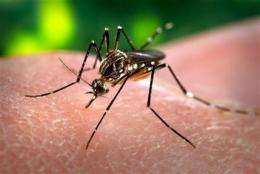Specialized mosquitoes may fight tropical disease

Scientists have made a promising advance for controlling dengue fever, a tropical disease spread by mosquito bites. They've rapidly replaced mosquitoes in the wild with skeeters that don't spread the dengue virus.
More than 50 million people a year get the dengue virus from being bitten by infected mosquitoes in tropical and subtropical areas, including Southeast Asia. It can cause debilitating high fever, severe headaches, and pain in the muscles and joints, and lead to a potentially fatal complication. There's no vaccine or specific treatment.
Some scientists have been trying to fight dengue by limiting mosquito populations. That was the goal in releasing genetically modified mosquitoes last year at sites in Malaysia and the Cayman Islands.
Australian scientists took a different tack, they report in Thursday's issue of the journal Nature.
First, they showed that Aedes aegypti mosquitoes, the chief carriers of the dengue virus, resist spreading that virus if they are infected with a particular kind of bacteria. Then they tested whether these resistant mosquitoes could displace their ordinary cousins in the wild, thus reducing the number of dengue-spreading mosquitoes.
The resistant mosquitoes have an advantage in reproduction. Resistant females can mate with either resistant or ordinary mosquitoes, and all their offspring will be resistant. But when ordinary females mate with a resistant male, none of the offspring survive.
For the experiment, scientists released more than 140,000 resistant mosquitoes over 10 weeks in each of two isolated communities near Cairns in northeastern Australia, starting last January. By mid-April, monitoring found that resistant mosquitoes made up 90 percent to 100 percent of the wild population.
The result is a "groundbreaking first step," Jason Rasgon of the Johns Hopkins Bloomberg School of Public Health in Baltimore wrote in a commentary accompanying the paper. Rasgon, who did not participate in the study, said the next hurdle is to test the idea in areas where dengue is spread constantly, rather than sporadically as in Australia. Researchers will also have to show it works against varied strains of the dengue virus, he said.
More information:
"A non-virulent Wolbachia infection blocks dengue transmission and rapidly invades Aedes aegypti populations"
Authors: T. Walker, University of Queensland, Australia; P.H. Johnson, James Cook University, Cairns, Queensland, Australia; A. Lloyd, North Carolina State University, et al. Published: Aug. 25, 2011 in Nature
Journal: www.nature.com/nature
Disease information: http://bit.ly/r0i8Lq
©2011 The Associated Press. All rights reserved. This material may not be published, broadcast, rewritten or redistributed.















